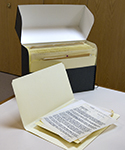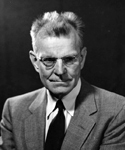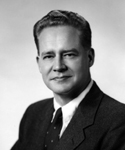Edith S. and Frederic E. Clements Papers
Frederic and Edith Clements were husband and wife botanists and pioneering ecologists. Collection contains field notes, photographs, and negatives from 1893-1944, chiefly regarding vegetation and ecology of the Great Plains and the American West and Southwest; correspondence with colleagues regarding scientific research; manuscripts and articles on scientific topics; and Edith Clements’ diaries from 1907-1966, family photographs, poems, essays, and sketches.
Floyd F. Dominy papers
Dominy was appointed Commissioner of the United States Bureau of Reclamation in 1959 by President Eisenhower, and served until his retirement in 1969. As Commissioner, Dominy administered national and international programs and directed the following major projects: Colorado River Storage Project, Colorado River Basin Project, Missouri River Basin Project, Columbia River Basin Project, Central Valley Project in California, and Mekong River Basin Project in Thailand.
Murie Family Papers
The Murie Family Papers consist predominately of the professional papers of three famous conservationists, Olaus Murie, Margaret Murie, and Adolph Murie. The collection contains reports, correspondence, memoranda, field notes and journals, publications, and an extensive collection of films. The materials relate to public land management wildlife conservation in Alaska, western Wyoming, and the desert Southwest.
M. King Hubbert papers
Marion Hubbert (1903-1989) was born in central Texas and studied geology and physics at the University of Chicago, reviving his Ph.D. 1937. He taught geology and geophysics at Columbia University. He served as senior analyst of world mineral resources on the Board of Economic Warfare during World War II. From 1943 to 1964 he worked for Shell Oil in Houston. After leaving Shell he became research geophysicist with the U.S. Geological Survey. He continued to teach as a visiting at Stanford University and UC Berkeley. He was a prolific author of scientific articles.
Brock Evans Papers
Brock Evans was an attorney and environmental activist. Evans was Associate Executive Director and then Director of the Sierra Club in Washington D.C. He became the Vice President for National Issues at the National Audubon Society in 1981. Later, he joined the Endangered Species Coalition as its executive director. He later served as chairman of the Natural Resources Council of America and was on the Board of Directors of the Sierra Club and the Center for Urban Environmental Studies. He testified over 200 times before over 20 congressional committees and subcommittees.
Edward Ackerman Papers
Edward Ackerman was a geographer and water resources authority. He served as a technical advisor on natural resources to U.S. occupational forces in Japan from 1946-1948. From 1952-1954 he served as assistant general manager of the Tennessee Valley Authority and became director of water resources program of Resources for the Future from 1954-1958. He served on several committees and panels pertaining to natural resources, population growth, and environment and conservation issues.






